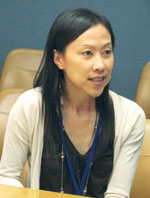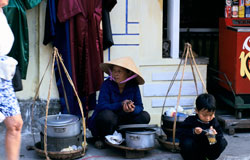Refugee returns to Vietnam in hope of saving lives
July - August, 2009 | Volume 8, Issue 4
Her father was imprisoned by the communists, her older brother became one of the "boat people" fleeing Vietnam in the early 1980s, and Thuy Le spent the first 17 years of her life in Ho Chi Minh City (once known as Saigon) before emigrating to Arizona.
Now, after training at the University of Arizona, Tufts and Yale, Dr. Le feels "compelled to bring something back to my country."
As one of Fogarty's International Clinical Research Fellows, Le will spend the next year in the former capital of South Vietnam conducting a randomized controlled trial comparing the efficacy of two drugs - one expensive and one not - in the treatment of a Southeast Asian fungus that attacks patients with compromised immune systems, particularly those with HIV/AIDS.

Dr. Thuy Le is going back to
Vietnam to apply her U.S.
training where she grew up.
Born: Ho Chi Minh City
(Saigon)
Hometown: Tucson, AZ
Age: 36
Degrees: B.S. in molecular
and cellular biology, M.D.,
University of Arizona
Residency: Tufts University
Current: Infectious diseases
fellow, Yale University.
Training site: Oxford
University Clinical Research
Center, Ho Chi Minh City
Growing up in Vietnam, she says, "I witnessed poverty, poor sanitation, overcrowding and lack of resources, and that led me to the field of infectious diseases."
She is working at the Oxford University Clinical Research Institute, a facility in Vietnam sponsored by the Wellcome Trust of Great Britain, under Fogarty sponsorship.
During a return visit in 2003, Le was shocked by the prevalence of HIV/AIDS, the stigma attached to it and the lack of treatment.
Such patients now are "doing fantastic," she says, due to the President's Emergency Plan for AIDS Relief.
But those who are not on treatment are subject to 100 percent fatality rates if untreated for the systemic fungus Penicillium marneffei, whose origin is either in the soil or among bamboo rats.

Photo by Curt Carnemark, courtesty World Bank
The poverty and disease that Dr. Thuy Le saw in
post-war Vietnam motivated her to study infectious
diseases. Now, she is back in her native country as
a Fogarty fellow working on treatment for a regional
fungus.
Her trial will compare low-cost oral administration of the drug itraconazole versus the standard and much more expensive intravenous use of amphotericin B, which has significant side effects. She also wants to study the fungus's epidemiology by means of global positioning mapping.
"The work is intellectually interesting, but at the same time it gives me personal meaning to bring the knowledge that I have learned in America to contribute to the medical field in Vietnam," she says.
"I felt privileged when I had a chance to come to the United States, and I felt compelled to bring something back to my country."
Although the fungus she is studying is endemic to Southeast Asia, "I think it is very important for the U.S. to fund this kind of research."
It is such a great opportunity for us to see diseases we don't see in the United States. And keep in mind that diseases are traveling. We should look at it as a global issue."
Another reason for supporting research like this for young American investigators, she explains, is "because if we don't do this early in our careers, we're not likely to do it later. ... I wouldn't be able to do this without Fogarty."
To view Adobe PDF files,
download current, free accessible plug-ins from Adobe's website.